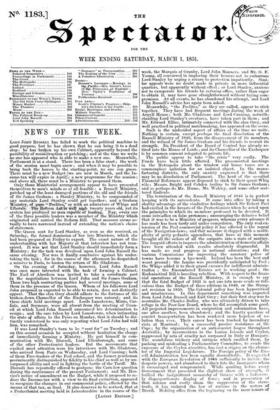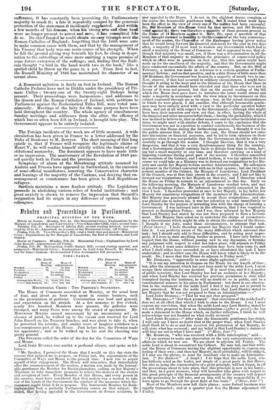NEWS OF THE WEEK.
teal) JOHN- ItussErs, has failed to work the political machine to good purpose but he has shown that he can bring it to a dead atop : he has brokenup his own Cabinet, apparently beyond the possibility of rectiiartiction or patching; and at the time we write no one has appeared who is able to mike a new one. Meanwhile, Parliament is at a stand. There has been a false start ; the work of the session must begin anew ; and when it may be possible to bring back the horses to the starting-point, no one can guess. There must be a new Budget (we are now in March, and the In- come-tax will expire in April); a new programme for the session ; and above all, there must be a Ministry to propound them. Only three Ministerial arrangements appear to have presented themselves to men's minds as at all feasible : a Russell Ministry, Patched up of the least damaged portions of the old and the friends of Sir James Graham ; a Stanley Ministry, to be compounded of any materials Lord Stanley could get together; and a Graham Ministry, of pure " Peelitest or with an admixture of Whigs and Liberals. The Reform. Act is Well nigh twenty years old, yet its system has produced no man capable of leading. Nay, every one of i the three possible leaders was a member of the Ministry -which originated and carried the Reform Bill. That measure seems ac- tordly to have narrowed instead of extending the nation's choice of statesmen.
• The Queen sent for Lord Stanley, as soon as she received, on Saturday, the formal demission of her late Ministers, which she had been prepared on Friday to expect. The exact nature of the understanding with her Majesty at that interview has not tran- spired. It was not that Lord Stanley should immediately form a Ministry; for the task was devolved upon Lord John Russell the same evening. Nor was it finally conclusive against his under- taking the task ; for in the course of the afternoon he despatched a missive to Paris, to hasten the return of Mr. Gladstone.
On the evening of Saturday, however, Lord John Russell Was once more intrusted with the task of forming a Cabinet. The Earl of Aberdeen was invited to take a coordinate part in the negotiations between Lord John and Sir James Graham. These two high contracting parties had several meetings, some of them in the presence of the Queen. Whom of his followers Lord John proposed or expected to be able to retain, does not distinctly appear. That the elan Grey should adhere to the fortunes of the broken-down chancellor of the Exchequer was natural ; and its three chiefs held meetings apart. Lords Lansdowne, Minto, Car- lisle, and Seymour, were all absent from the meeting of Coun- eit at which Lord John Russell announced his determination to resign ; and the care taken by Lord Lansdowne, when intimating the state of affairs to the Peers on Monday, that it should be dis- tinctly understood he was only repeating what Lord John had told him, was remarked. It was Lord StanIty's turn to be .." sent for" on Tuesday ; and on this second occasion he accepted without hesitation the charge of immediately forming a Ministry. He put himself in com- munication with Mr. Disraeli, Lord Ellenborough, and some of the other Protectionist leaders. But the movements that excited most attention were his interviews with Mr. Gladstone, who arrived from Paris on Wednesday, and Lord Canning; both of them Free-traders of the Peel school, and the former gentleman preeminently distinguished by fidelity to his chief as well as by un- surpassed ability and zeal in fighting the battle of the Tariff. Mr. Disraeli has repeatedly offered to postpone the Corn-law question during the continuance of the present -Parliament ; and Mr. Her- ries's notice of amendment on the Budget, while it proposed to re- duce the Income-tax with a view to its final extinction, appeared to recognize the changes in our commercial policy, effected by the means of that tax, as final. It also deserves to be noticed, that at
Protectionist meeting held in Leicestershire in the course of the week, the Marquis of Granby, Lord John Manners, and Mr. G. F. Young all concurred in imploring their hearers not to embarrass Lord Stanley by urging a return to protection impatiently. Simi- lar appeals were no doubt made in private in more influential quarters, but apparently without effect ; or Lord Stanley, anxious not to exasperate his friends by refusing office, rather than eager to obtain it, may have gone straightforward without trying com- promises. At all events, he has abandoned his attempt, and Lord John Russell's advice has again been asked.
Meanwhile, " the Peelites," as they are called, appear to stick together. They have had frequent meetings during the week at Argyll House ; both Mr. Gladstone and Lord Canning, notwith- standing Lord Stanley's overtures, have taken part in them ; and Mr. Edward Ellice, intimately connected with the clan Grey, and well practised in political matchmaking, has appeared on the scene. Such is the undecided aspect of affairs at the time we write. Nothing is certain, except perhaps the final dissolution of the Russell Ministry of 1846, from the disagreement of its members, and the refusal of Sir James Graham and his friends to recruit its strength. Its President of the Board of Control has already re- tired unto the House of Lords ; and its Chancellor of the Exchequer is by common consent relegated to private life.
The public appear to take "the crisis" very coolly. The Funds have been little affected. The preconcerted meetings in the Metropolis about the window and house taxes are a commonplace agitation for an isolated object. In the manu- facturing districts, the only anxiety expressed is that there may be no dissolution of Parliament. The herd of the so-called Financial Reformers appear disposed to stick to their quasi-Whig role; Messrs. Bright and Cobden incline to Sir James Graham; and so perhaps do Mr. Hume, Mr. Wakley, and some other scat- tered Radicals.
The termination of the Russell Ministry of 1846 is in perfect keeping with its antecedents. It came into office by taking a shabby advantage of the vindictive feelings which Sir Robert Peel had excited in the breasts of the Protectionists when he acted upon the prineiples to which its members professed to be devoted. It came into.office on false pretences ; encouraging the delusive belief that it was to be a Ministry of progress, whereas evbry advance it has made has been tardy and under compulsion. The only real ex- tension of the Peel commercial policy it has effected is the repeal of the Navigation-laws ; and that measure it clogged with a multi- plicity of petty pedantic appendices, that have at this moment brought all the sailors of all the outports into a state of mutiny. The languid efforts to improve the administration of domestic affairs have been attended with results absolutely disgraceful. It has made no real progress in national education; and the various Commissions for improving the sanatory police of towns have become a bye-word. Ireland has been the best and worst ground : the famine was providently anticipated by Peel ; the .Whigs added it to their grand excuses for indifferent adminis- tration ; the Encumbered Estates act is working good ; the Ecclesiastical Bill is breeding rebellion. With respect to the finan- cial operations of the Russell Ministry, it is enough to say that the fatal Budget of 1851 is not one iota more crude or ridi- culous than the Budget of three editions in 1849, or the Stamp- act revision in 1850. The Colonial policy has been hypocritical and mischievous. In this department something was expected from Lord John Russell and Earl Grey ; but their first step was to neutralize Mr. Charles Buller, who was ultimately driven to take refuge in the Poor-law Board, where he did accomplish some good. All projected improvements in emigration and colonization have, one after another, been abandoned ; and the knotty question of convict transportation has been rendered more hopeless of so- lution than ever. Their career has been tracked by incendiary riots at Montreal ; by a -successful passive resistance at the Cape ; by the organization of an anti-convict league throughout Australia ; by insurrections in the Ionian Islands and Ceylon, suppressed by acts of Oruelty not surpassed in Italy or Hungary. The scandalous trickery and intrigue which enabled them, by packing and Misleading a Parliamentary Committee, to evade the exposure of the Ceylon atrocities, has cast a stigma on the charac- ter of the Imperial Legislature. The Foreign policy of the Rus- sell Administration has been equally discreditable. It coquetted with the European Revolution of 1848 sufficiently to irritate the despotic powers, and abandoned to their fate the insurgents whom it encouraged and compromised. While quailing before every Government that presented the slightest show o. strength, it bullied the insignificant monarchy of Greece with a ludicrous- ly disproportionate display of force ; and in prosecution of that solemn and costly sham the suppression of the slave- trade, it has violated the law of nations in the waters of Brazil. Holding office from the beginning on the mere tenure of sufferance, it has constantly been provoking the Parliamentary majority to crush it; a fate it repeatedly escaped by the generous protection of the statesmanit insidiously suppknted. And within. a few months of his deeease, when iis strongtarm an clear he were no longer present to wrest and SOVC, it bas committed feb) de se. Its chief fanoied he could editain an vats. triumph nver the, Roman Catholics of England ; forgetting that-the Irish were sure to make common cause with them, and that by the management of his Viceroy that body was one main source of his strength. When he felt the ground giving way beneath his feet, he clung in despe- ration to the subterfuge of once more emitting a vague promise of some future extension of the suffrage; and, finding that the Radi- cals thought "a bird in the hand worth two in the bush," like a spoiled child he threw up the game in a pet. From first to last, the Russell Ministry of 1846 has maintained its character of an arrant sham.



























 Previous page
Previous page